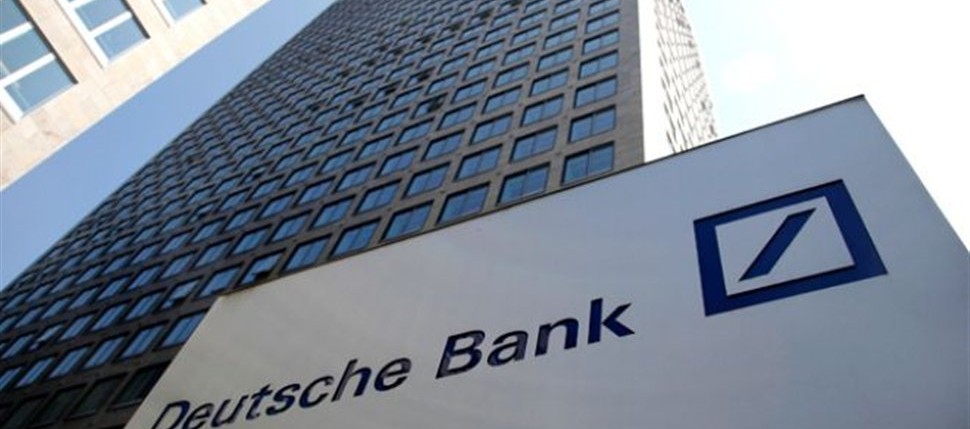
Έκθεση της Deutsche Bank αναφέρει το Bitcoin ως ένα από τα συστήματα πληρωμών του μέλλοντος
Νέα έκθεση του τομέα τεχνολογικής έρευνας της γερμανικής τράπεζας Deutsche Bank αναφέρει το Bitcoin ως ένα από τα συστήματα άμεσων πληρωμών που θα γίνουν ευρέως διαδεδομένα τα επόμενα χρόνια. Η έκθεση με τίτλο ‘Instant Revolution of Payments?’ αναλύει τις δυνατότητες δημιουργίας συστημάτων άμεσων πληρωμών ώστε να μειωθεί ο σχετικά μεγάλος χρόνος μεταφοράς κεφαλαίων που υπάρχει σήμερα στον τραπεζικό τομέα.
Ειδική αναφορά γίνεται όπως είναι φυσικό στην τεχνολογία του Bitcoin Blockchain αλλά και στο ίδιο το ψηφιακό νόμισμα θεωρώντας το ως μια τεχνολογία που ενώ είναι ακόμα στα πρώτα της βήματα έχει την δυναμική να αναμορφώσει τελείως το τομέα πληρωμών στο τραπεζικό σύστημα.
Decentralised payment networks: blockchain technologyBlockchain technology offers a way to pay in (near) real time. Moreover, thisrelatively novel technology is a method that allows the payer to pay the payeewithout using an intermediarycontrary to other electronic payment systems.Today, Bitcoin is the most prominent example among several decentralizedpeer-to-peer networks using blockchain technology to transfer funds and toensure trust between participants. A blockchain is essentially a ledger which ismaintained by many participants in the network in the form of identical copies. All valid transactions executed via the network are recorded in the blockchain(also called distributed or publicly shared ledger). In order to make changes tothe ledger, i.e. conduct transactions, the system uses an inherent process toreach consensus on such changes between all participants.Blockchaintechnology combines elements from various disciplines, like cryptography(secure communication), game theory (strategic decision-making) and peer-to-peer networking without central co-ordination.
Τα αρνητικά σημεία που βλέπει η γερμανική τράπεζα στα αποκεντρωμένα συστήματα συναλλαγών όπως το Bitcoin είναι ότι όπως αναφέρει δεν έχουν δοκιμαστεί μέχρι στιγμής σε συνθήκες μεγάλου όγκου συναλλαγών, η αδυναμία δημιουργίας ενός νομοθετικού πλαισίου γι αυτά λόγο της αποκεντρωμένης φύσης τους καθώς και το υψηλό κόστος λειτουργίας τους φέρνοντας ως παράδειγμα το Bitcoin που για να διατηρήσει την ασφάλεια του βασίζεται σε ένα πανάκριβο αποκεντρωμένο δίκτυο υπολογιστών.
Επιπρόσθετα αναφέρει ότι το Bitcoin απέτυχε να δημιουργήσει ένα τελείως αποκεντρωμένο σύστημα καθώς ήδη έχουν δημιουργηθεί πολλές ενδιάμεσες εταιρείες διαχείρισης του ψηφιακού νομίσματος με μερικές από αυτές να είναι τα cloud wallet, τα ανταλλακτήρια και οι ενδιάμεσες εταιρείες πληρωμών με Bitcoin στα εμπορικά καταστήματα.
The Bitcoin concept combines and blurs the aspects of being a privately issuedcurrency and a system to transfer this currencyYet, blockchain technology isnot restricted to transferring virtual currencies like Bitcoin. Rather, it representsan innovative way to register and transfer any digitally represented value in asecure and decentralized manner. Trust in the integrity of the ledger is reachedwithout central intermediaries. At present, (central) banks or public authoritiesserve as a source of integrity for commercial bank accounts or for public regist-ers. As regards payments, central agents for clearing prevent double spendingand invalid transactions in bank and card payment systems. By contrast, block-chain technology achieves the same within a decentralized network
Την έκθεση μπορείτε να την διαβάσετε ολόκληρη εδώ και είναι μέσα από άρθρο του Coindesk.
